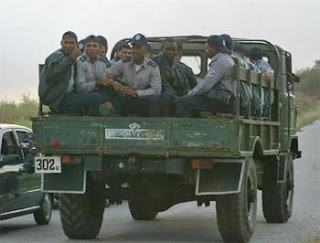 |
| Cubans line up in front of a Havana Internet Café on Obispo street in Old Havana. |
Now, if only his fellow Cubans could get in on the cyber-party.
Less than 3 percent of islanders used the internet at least once over the past year and only about 6 percent used email, according to a nationwide survey released Thursday by the state-run National Office of Statistics.
Cuba has long published annual statistics on its internet and cell phone users. But the level of detail contained in this survey had not been made public before – and it revealed a country astoundingly behind the technological times.
Just 2.9 percent of survey responders said they had used the internet in the past 12 months, and the majority of those did so at work or school – not from home. Cuba only legalised the sale of computers to the general public in 2008, though they were, and still are, widely available on the black market.
The tally paints a far bleaker picture than the statistics office’s annual report on connectivity, which found that Cuba had 1.6 million internet users last year. But even that is far below internet access in any other country in Latin America, according to international surveys.
Statistics officials based their study on interviews with 38,000 households across the island from February to April. The office did not say whether the survey was done in person or over the phone, and it listed the margin of error only as less than five percentage points.
It was not clear how many Cubans themselves would see the statistics, however, since they were posted on the agency’s website.
The communist government severely limits Web access, but says it has no choice given that Washington’s 48-year-old embargo doesn’t allow Cuba to access US service providers located close by. Instead, the island must rely on slow and costly Internet via satellite from Europe and other faraway locales.
Meanwhile, authorities block blogs that are critical of the government as well as other pages containing content that is considered counter to Castro’s 1959 revolution.
Venezuelan President Hugo Chavez has promised to lay a fibre-optic cable from his country to Cuba to improve connectivity here, but those plans have been stalled for years.
Of those surveyed by the National Office of Statistics, only 5.8 percent said they use e-mail. The survey did not say how often.
Ordinary Cubans can join an islandwide network that allows them to send and receive international e-mail, but lines are long at youth clubs, post offices and the few Internet cafes that provide access.
The survey also found that just 2.6 percent of respondents regularly use cell phones, despite the government’s dramatic lifting of bans on them two years ago. That was slightly higher than the 2.5 percent who said they own cell phones or have been issued them for work _ meaning some are using phones that belong to relatives, friends or neighbours.
Those percentages are substantially lower than previously released figures, with the state-controlled telecommunications monopoly reporting in July that more than 1 million cell phone lines were in use nationwide. Cuba has a population of 11.2 million people.
Mobile phones in Cuba had been prohibited for all but tourists and foreigners, some government employees, business officials and academics. But in April 2008, just two months after he succeeded his brother as president, Raul Castro authorized their sale to all who could afford them.
From: Updated News

















